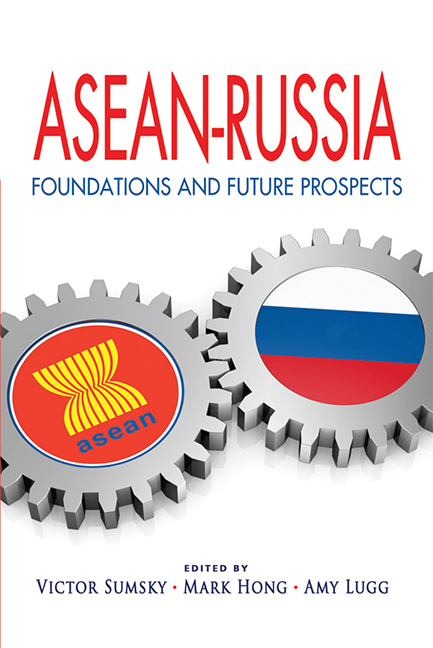Book contents
- Frontmatter
- Contents
- Foreword
- Preface
- About the Contributors
- Keynote Address
- Opening Remarks
- Keynote Address
- Introduction: Russia and the ASEAN Member States: Political and Economic Cooperation in Progress
- SECTION I WISEMEN'S VIEWS
- SECTION II GEOPOLITICS
- SECTION III BILATERAL RELATIONS
- What Singapore May Offer to Russia? The Present State and the Prospects of Relations
- Myanmar-Russia Relations in a Changing World: Growing Ties based on Strategic Partnership and Economic Prospects
- Russian-Myanmar Relations
- Russia-Thailand Relations: Historical Background and Contemporary Developments
- Russia and Vietnam: Building a Strategic Partnership
- Malaysia-Russia Relations: Revving up a Distant Relationship
- Cambodia and the USSR/Russia: Fifty-five Years of Relations
- SECTION IV Business and Economics
- SECTION V CULTURE AND EDUCATION
- EPILOGUE
- Index
Myanmar-Russia Relations in a Changing World: Growing Ties based on Strategic Partnership and Economic Prospects
from SECTION III - BILATERAL RELATIONS
Published online by Cambridge University Press: 21 October 2015
- Frontmatter
- Contents
- Foreword
- Preface
- About the Contributors
- Keynote Address
- Opening Remarks
- Keynote Address
- Introduction: Russia and the ASEAN Member States: Political and Economic Cooperation in Progress
- SECTION I WISEMEN'S VIEWS
- SECTION II GEOPOLITICS
- SECTION III BILATERAL RELATIONS
- What Singapore May Offer to Russia? The Present State and the Prospects of Relations
- Myanmar-Russia Relations in a Changing World: Growing Ties based on Strategic Partnership and Economic Prospects
- Russian-Myanmar Relations
- Russia-Thailand Relations: Historical Background and Contemporary Developments
- Russia and Vietnam: Building a Strategic Partnership
- Malaysia-Russia Relations: Revving up a Distant Relationship
- Cambodia and the USSR/Russia: Fifty-five Years of Relations
- SECTION IV Business and Economics
- SECTION V CULTURE AND EDUCATION
- EPILOGUE
- Index
Summary
INTROD UCTION
Myanmar and Russia are separated by oceans and continents. Notwithstanding the geographic distance, the two countries have developed close relations based on mutual understanding, economic opportunity and strategic considerations. From the time they established diplomatic relations on 18 February 1948, barely a month after Myanmar became independent, the two sides have nurtured their relationship. Similarity in their outlook on major regional and international issues has helped to bring them closer. On the world stage, both countries agree on the need to strengthen the central role of the United Nations and the Security Council in maintaining international peace and security and in fighting terrorism and other challenges faced by the international community. Regular consultations between the Ministries of Foreign Affairs undertaken in accordance with an agreement signed in 1999, have allowed the two sides to coordinate positions on international issues.
MYANMAR-RUSSIA RELATIONS
The first high-level exchange of visits between Myanmar and Russia took place in 1955. Prime Minister U Nu visited the Soviet Union in October 1955 and Soviet leaders Nikita Khrushchev and Nikolai Bulganin returned the visit two months later. Premier Khrushchev paid another visit to Yangon in February 1960. Prior to the visit, a trade agreement was signed, leading to mutually beneficial economic cooperation. In exchange for Myanmar rice, the Soviet Union carried out a number of building projects that included the Rangoon Institute of Technology, the General Hospital in Taunggyi and the Inya Lake Hotel in Yangon. People-to-people exchanges were also promoted. This led to an exchange of delegations that ranged from music and dance troupes to sports teams.
Following the collapse of the Soviet Union in 1991 however, Myanmar- Russia relations were at a low ebb as the Russian Federation was obliged to focus more on managing the transition at home than on relations with distant countries. The two countries revived their relations once the situation in Russia improved.
- Type
- Chapter
- Information
- ASEAN-RussiaFoundations and Future Prospects, pp. 150 - 155Publisher: ISEAS–Yusof Ishak InstitutePrint publication year: 2012



